May 3, 2014
Patrick G. Rhodes-Vivour, Sahara
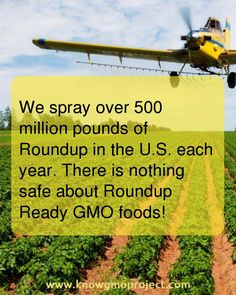
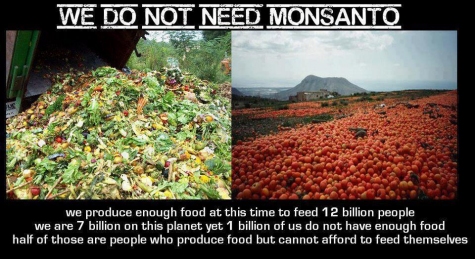
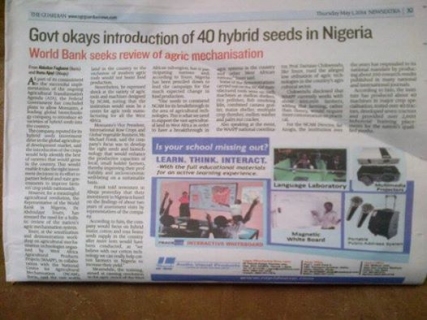
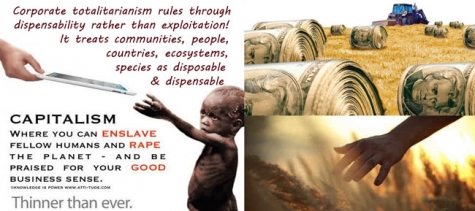
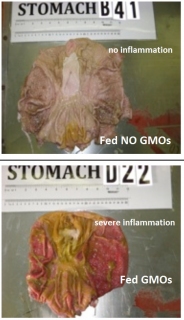
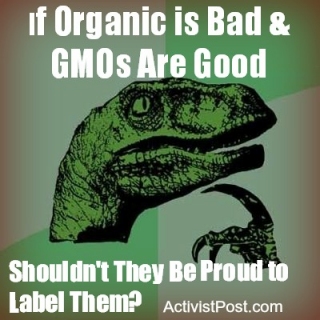
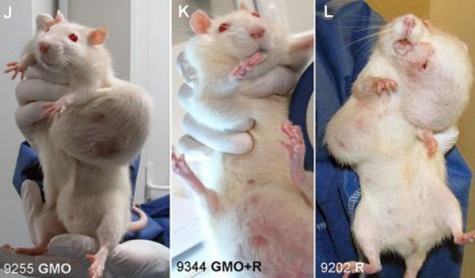

Executive Summary: In order to access a $300 million fund from the G8, The agriculture minister and the federal government are in the process of opening our country to genetically Modified foods and seeds. These hybrid / genetically modified seeds damage the soil and produce resistant varieties of weeds and bacteria. This then makes the natural variant of the plant not to be able to grow on the soil. Furthermore the seeds produced by this form of farming are sterile. So that means every time a farmer wants to plant seeds, they would have to buy from Monsanto or Dupont.
In so doing farmers become completely dependent on these foreign companies to be able to plant. The prices of these seeds are not fixed . The ecological damage on the soil and environment is immense, making the soil depend on more and more fertilizer and pesticides to yield.
These seeds have been known to contaminate surrounding areas. So even if you do not participate in the program, your land can be infected Health wise, Hybrid crops (GMO’s) have been linked to cancer and obesity as well as deaths in animal populations.
Lastly several countries have banned Monsanto and its methods in their countries.
This include :
In Australia: Several Australian states had bans on GM crops but most of them have since lifted them. Only South Australia still has a ban on GM crops, though Tasmania has a moratorium on them until November of 2014.
In Japan: The Japanese people are staunchly opposed to genetically modified crops and no GM seeds are planted in the country. However, large quantities of canola are imported from Canada (which is one of the world’s largest producers of GM canola) and there is now GM canola growing wild around Japanese ports and roads to major food oil companies. Genetically modified canola such as Monsanto’s Roundup Ready canola have been found growing around 5 of the 6 ports that were tested for GM contamination.
In New Zealand: No GM foods are grown in the country.
In Germany: There is a ban on the cultivation or sale of GMO maize.
In Ireland: All GM crops were banned for cultivation in 2009, and there is a voluntary labeling system for foods containing GM foods to be identified as such.
In Austria, Hungary, Greece, Bulgaria and Luxembourg: There are bans on the cultivation and sale of GMOs.
In France: Monsanto’s MON810 GM corn had been approved but its cultivation was forbidden in 2008. There is widespread public mistrust of GMOs that has been successful in keeping GM crops out of the country.
In Madeira: This small autonomous Portugese island requested a country-wide ban on genetically modified crops last year and was permitted to do so by the EU.
[b]In Switzerland: The country banned all GM crops, animals, and plants on its fields and farms in a public referendum in 2005, but the initial ban was for only five years. The ban has since been extended through 2013.
In India: The government placed a last-minute ban on GM eggplant just before it was scheduled to begin being planted in 2010. However, farmers were widely encouraged to plant Monsanto’s GM cotton and it has led to devastating results. The UK’s Daily Mail reports that an estimated 125,000 farmers have committed suicide because of crop failure and massive debt since planting GM seeds.
In Thailand: The country has zigzagged in its support and opposition of GM crops. The country had widespread trials of GM papayas from Hawaii but reversed its plans when the seeds got wild and began contaminating nearby crops. Several countries such as Japan moved to restrict the importation of Thailand’s papayas as a result, not wanting to import any GM foods. Thailand is currently trying to embrace both sides — producing organic foods for some countries at a high price while moving towards embracing more and more GM crops. The country has also tried declaring some areas GMO-free zones in order to encourage other countries to trust their foods.
Russia
Last September, Russia suspended the import and sale of Monsanto’s genetically modified corn after a French study suggested it may be linked to cancer. The Prime Minister ordered regulatory agencies to consider a possible ban on all GMO imports into Russia.
FRANCE
France’s agriculture ministry on Saturday banned the sale, use and cultivation of Monsanto’s MON 810 genetically modified maize, the only variety currently authorized in the European Union.
United states
Monsanto Has fought the Truth and Labeling initiative, and won. The aim of this initiative was to let people know when foods have been made from hybrid or GMO foods by labeling them. Monsanto has refused this so people no longer know what they are actually eating.
IN CONCLUSION
Nigeria does not have the technical know-how or infrastructure to keep track of the effects of introducing genetically modified seeds or as our minister prefers to call it , Hybrid crops. If “developed” countries are having difficulties with GMO foods the motive of our government for insisting on its introduction to our land must be questioned. Our Land is extremely fertile. Our farming methods have not even been fully mechanized yet our 150million population is eating. It was reported in the guardian on april 28th 2014 – “The minister urged Nigerians not to be afraid of genetically modified foods, and said that appropriate regulatory agencies should be put in place to check the benefits and risk associated with such foods.” – Surely would it not make sense to put all these in place BEFORE signing agreements with Monsanto? Are our scientist more experienced with GMO’S than scientist of Germany / Greece / Japan even America has brought several cases against Monsanto. All of this for the paltry sum of $300million aid money when $20BILLION has gone out of our system and we have not collapsed.
To read a more detailed report with sources and evidence please see
An article was also published in the guardian on April 28th page 14-15
For the full framework
http://www.sunbirdbioenergy.com/docs/sunbird-fmard-new-alliance-progress-report-coop-framework-nigeria.pdf
We plan to pursue legal avenues as well as an outreach to educate Nigerians about the dangers of allowing this to happen in Nigeria. Please join our facebook page to get more information.
[url] FACEBOOK.COM/NAIJASAYSNOTOGMO[/url][url][/url]
We need to stand against this because we are the ones that would suffer the health consequences as well as the death of our (very fertile) soil. This New wave of colonialism is designed to secure profits and royalty flows out of Africa andThe dependency on foreign corporations to plant food .
Rather than all this our existing planting methods that have kept our soil so fertile can be improved and mechanized. Funds can be giving to farmers to engage permaculture and a host of other more sustainable farming techniques.
Patrick G. Rhodes-Vivour





